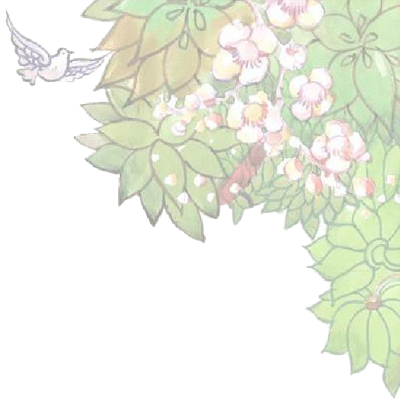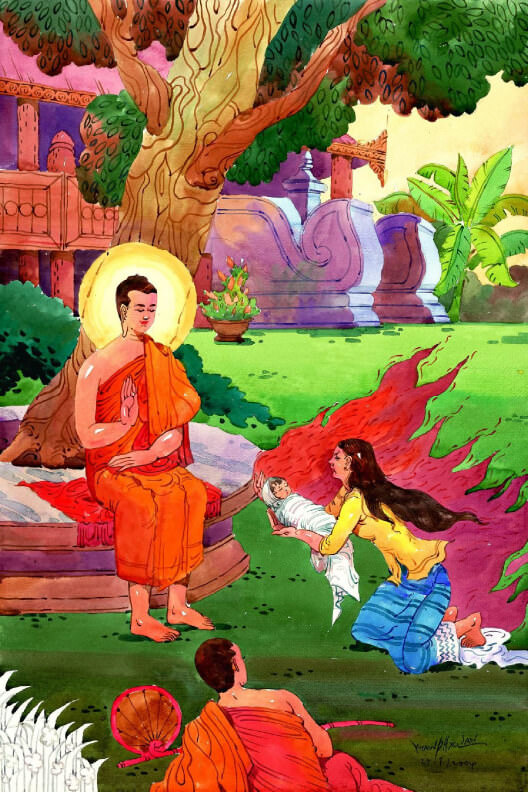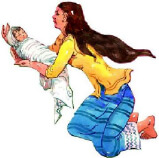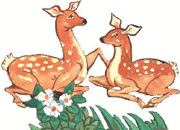58話 幼な子に死なれた母 ・・・・ キサーゴータミー

第5部 さまざまな「悪」
第3章 弱き者へ―病の比丘・嘆きの母
58話 幼な子に死なれた母 ・・・・ キサーゴータミー

かつてサーヴァッティ(舎衛城)に、ゴータミーという名の少女が住んでいた。もとは裕福な家の娘であったが、家運が傾き、貧しい家の娘となった。ほっそり、やせた体つきに育ったのでキサーゴータミー(やせっぽち(キサー)のゴータミー)と呼ばれた。
それとほぼ同じころ、裕福だったのに、みずからの善行の功徳が尽きてしまったことによって、ふしぎなことに財産が炭に変わった男がいた。かれは落胆した。食欲を失い、ベッドで日を過ごすだけになった。
このことに気づいて、かれの友だちが訪れ、裕福だったのに破産した男に、こう助言した。
「わが友よ、きみの炭を、きみの家の前で売りたまえ。過去世で大きな功徳を積んだ誰かが、やって来るだろう。その人がきみの売った炭にふれて、それを君の手に渡すやいなや、もとがそうだったように、すべては金と銀に変わるだろう。しかしながら、その人が女ならば、きみは自分の息子と彼女を結婚させなければならない。だが、その人が男ならば、きみは自分の娘とかれを結婚させなければならない。きみはまた、四〇クローレ(四万金)のきみの財産を、かれまたは彼女に委ね、そして、そのかれまたは彼女に、家の切り盛りを任せるべきだ」
裕福だったのに破産した男は、友のこの助言に応じた。かれは自宅前に敷物を広げて、炭を売った。かれが炭を売っているのを見た通行人は、かれに、こういった。
「おや、ほかの人は油や蜂蜜、糖蜜などを売っているけど、あんたは炭を売っているんだね?」
裕福だったのに破産した男が「ひとは自分の持っているものを売るんです。何が悪いんですか?」と、答えた。
ある日、キサーゴータミーが通りがかり、かれに、こういった。
「おや、おとうさん、ほかの人は油や蜂蜜、糖蜜などを売っているのに、あなたは金と銀を売ってるんですね?」
裕福だったのに破産した男が「どこに金と銀がありますか?」と、問い返した。
「それじゃ、ここでは扱わないのですか?」と、キサーゴータミーがきいた。
裕福だったのに破産した男が「わたしに、金と銀をもってきてくれませんか、お嬢さん?」と、答えた。
キサーゴータミーは過去世で功徳を積んだ人間であった。彼女がひと握りの炭を手にして、かれにそれを手渡すやいなや、なんと! すべてが、本来そうであったように、金と銀に変わったのである。
裕福な男はすぐさま、かれの宝物をかき集め、キサーゴータミーをかれの家につれて行き、息子を彼女と結婚させた。かれは、彼女の内面の豊かさの真価を認めて、それは彼女の家柄や外見よりも重要、とみなしたのだ。しかしながら、彼女の夫になった息子以外の家族は、彼女を見下し、小馬鹿にしてあしらった。この敵意が彼女に大きな不幸をもたらした。とくに彼女の最愛の夫自身が、両親への愛情と、妻への愛情のはざまに、とらわれたからである。
ときが満ちてキサーゴータミーは男の子を出産した。それ以降、夫の家族全員から跡とり息子の母として敬意をもって扱われ、受け入れられた。いまや彼女はすっかり幸福で、満足していた。わが子への母親としての通常の愛情を超えて、彼女は特別に息子をかわいがった。なぜなら、かわいいこの息子こそ結婚生活の無上の幸せの保証であったからである。
しかしながら、この男の子は突然病気になり、やっとよちよち歩きから走りだしたばかりのとき、亡くなった。この悲劇はキサーゴータミーにとって、あまりにつらすぎた。こどもの喪失を、とうてい辛抱できなかった。夫の家族に、過去世の業で息子をもてないのだろう、といわれて、また見下されるのではないか、と彼女は不安になった。また、街の人びとにも「きっとキサーゴータミーは、あんな運命を招くような卑しむべきことをしたのだろう」と噂されるのでは、と心配した。さらに、夫が彼女を拒否し、もっと家柄のよい別の妻を探すのではないかしら、と恐れた。こうした妄想が心中を駆けめぐり、彼女の心に黒雲が垂れこめた。こどもが死んだという事実を受けいれるのを彼女は拒絶し、坊やは病気になっているだけで、よい薬がみつかったら治るはず、と信じ込んだのである。
亡き子を腕に抱き、彼女は、家から家へ、かわいいわが子のための薬をもとめて、あてもなくさまよい歩いた。各家のドアごとに、こう懇願した。
「どうか、わたしの坊やのために、何か薬をください!」
彼女はまるで感覚がないかのようにふるまい、まことに哀れな気配であった。とはいうものの、誰も彼女を助けられなかった。こどもは死んでおり、薬は役に立たない、と誰もが答えた。しかしながら、この答えを彼女は拒絶し、坊やは病気になっているだけ、と信じて、次の家に向かった。多くの人が彼女を馬鹿にして、あざ笑った。しかし、多くの身勝手で無慈悲な人びとの中で、ついに彼女は、賢明で親切な人に出会った。彼女が幼な子を失った嘆きのせいで半狂乱になって取り乱しているのだ、とわかった人である。かれは、こう助言した。
「かわいいお嬢さん、最高の医者がいますよ。ブッダです。きっと、ぴったりの薬を知っていますよ。ジェータヴァナ僧院(祇園精舎)に、かれは住まわれている。そこへ行って、かれにお願いしなさい!」
ただちにキサーゴータミーは、この助言に従って、ジェータヴァナ僧院へ急いで行った。そのとき世尊は聴衆に囲まれた中央の席に坐り、法話をまさに始めようとされていた。亡き子をわが腕に抱えた彼女は世尊のもとへ駆け寄り、こう訴えた。
「先生、薬をください。わたしの坊やのために!」
世尊は、過去世で積んだ彼女の功徳が、覚りに達するのに十分である、とご覧になられた。世尊はやさしく、こういわれた。
「ゴータミーよ、そなたは正しいことした。ここへ来て、そなたのこどもに薬をもとめるのは、まちがっていない。では、これからサーヴァッティのあらゆる家に行って、少量の芥子の種をもらうよう、お願いしなさい。かつて誰も死人が出ていない、どこの家からでもよい。そうしたら、それをわたしに持ってきなさい!」
彼女は世尊の言葉を信用して、街へ行った。最初の家で、彼女は「芥子の種をお持ちですか?」と尋ねた。
「ありますよ」と、家の主人が答えた。
そこで、彼女は「わたしの坊やの薬にするので、よろしければ、いくらかいただけませんか?」と、お願いした。
「もちろん、いいですよ」と、家の主人は応じた。
キサーゴータミーは、さらにきいた。「でも、ご主人、わたしはひとつ、知らなければならないことがあるんです。この家でかつて、どなたか死人が出ていませんか?」
「いや、もちろんいますよ! いったい何人、この家で死人が出たのか、誰が覚えているかな?」と、家の主人が答えた。
「それでしたら、わたしは芥子の種をいただけません」と、彼女は詫びた。
彼女は二番目の家、三番目の家と、次々に行ったが、同じ答えであった。ある家では最近死人が出た、といい、別の家では一、二年前に出た、といった。また、別のある家では、父が死に、それと別の家では、母が、息子が、娘が、という具合であった。彼女はとうとう、誰にとっても死は当たり前である、という真理に気づいたのである。
真理をしっかりと把握して、彼女は死体置き場へ行き、こどもを埋葬し、世尊のもとへ戻った。そのとき世尊は彼女に、芥子の種を得たかどうか、尋ねられた。彼女は「わたしは芥子の種が必要ではありません、尊師よ。ただわたしに、ゆるがない立場だけを、お与えください! わたしに拠りどころを得させてください!」と、答えた。
世尊は、すべての因縁によるものごとは無常である、という法話をされた。その後すぐに、世尊は、彼女に偈を唱えられた。
“こどもや家畜に心奪われ、ひどく執着している人を、死王はさらってゆく。
眠れる村が、洪水に押し流されるように” ・・・ (ダンマパダ287)
法話が終わったとき、キサーゴータミーは、預流果(ソーターパッティ)の覚りを確立した。それからすぐ、彼女は比丘尼僧団に入る許可を求めた。世尊は同意され、尼僧たちの住まいへ送り、彼女はそこで出家し、比丘尼として戒を受けた。
その後、キサーゴータミーは真理(ダンマ)を実践し、学習し、精進して洞察を得た。ある夜、彼女が布薩堂の中と周辺の灯明の世話をする当番であった。彼女は、音をたてて燃えている石油ランプの灯を観察した。その後すぐに、彼女は、絶え間なく音をたてて燃えている炎が、まるで生と死の起伏上下のようだ、と気づいたのである。彼女の洞察が成長していることを知られた世尊は、光輪に包まれて彼女の前へ姿を現され、再び短い偈を唱えられた。
“不死の境地を見ないで百年生きるより、不死の境地を見て
一日生きるほうが勝っている” ・・・ (ダンマパダ114)
彼女がこの偈を聴いたとき、すべての束縛を吹き消すことができ、阿羅漢に達し、解脱した。
また別の折に、世尊がジェータヴァナ僧院に住まわれていたとき、キサーゴータミーは、糞掃衣をまとう比丘尼として第一(lūkhacīvaradhara(ルーカチーワラダラ) 粗衣者)と宣言された。
(訳注: “糞掃衣を身にまとい、やせて、血管露われ、ひとり、林で禅定する者、
かの者をわたしは聖者(バラモン)と呼ぶ” ・・・ ダンマパダ395)
※ 画像やテキストの無断使用はご遠慮ください。/ All rights reserved.

Episode 58 Kisāgotamī, THE MOURNING MOTHER
There lived in Sāvatthi a girl named Gotamī, daughter of a rich family whose fortunes had dwindled and who was in a state of poverty. Because she grew up with a thin and emaciated (kisa) body, she was called Kisāgotamī.
At about the same time in Sāvatthi, there was a rich man whose properties were strangely turned into charcoal due to the exhaustion of his good merits (kamma). He became downhearted. He lost his appetite and spent his days by only lying down on his bed. Noticing this, his friend visited and encouraged the ruined rich man with an advice: “My friend, sell your charcoal in front of your house. There will come someone with great past merits. As soon as the person touches and delivers into your hands the charcoal you are selling, all would change into gold and silver as they originally had been. However, if the person were a girl, you must marry her with your son. But if the person were a man, you must marry him with your daughter. You should also entrust forty crores of your property to him or her, and let him or her manage your household.”
The ruined rich man took his friend’s advice. He spread a mat in front of his house and sold his charcoal. The passers-by who saw him selling charcoal said to him: “O, other people sell oil, honey, molasses, etc., but you are selling charcoal?”
The ruined rich man replied: “One sells what one owns. What’s wrong with it?”
One day, Kisāgotamī came along to him and said: “O father, other people sell oil, honey, molasses, etc., but you are selling gold and silver?”
The ruined rich man replied: “Where are the gold and silver?”
“Well, are you not dealing in them here?” asked Kisāgotamī.
The ruined rich man replied: “Will you bring the gold and silver to me, little daughter?”
Kisāgotamī was a person with great past merits. As soon as she took a handful of the charcoal and handed it over him, lo! All of it turned into gold and silver as they originally had been.
The rich man immediately collected his riches, took Kisāgotamī to his house and married his son to her. He appreciated her inner wealth and considered it more important than her family background or outer appearance. However, other members of her husband’s family despised her and treated her disdainfully. This animosity caused her great unhappiness, especially because her beloved husband found himself
caught between love for his parents and love for his wife.
In due course, Kisāgotamī gave birth to a baby boy. From that time onwards, she was shown respect and accepted by her husband’s whole family as mother of the son and heir. Now, she was completely happy and contented. Beyond the usual love of a mother for her child, she was especially attached to her son because he was the guarantee of her marital bliss and peace of mind.
The boy, however, suddenly fell ill and died when he was just old enough to run about. The tragedy was too much for Kisāgotamī, who had never suffered loss of a child. She worried that her husband‘s family would again despise her, saying she was kammically unable to have a son. She was also worried that other people in town would say, “Kisāgotamī must have done some very despicable deeds to merit such
fate.” She feared that her husband might now reject her and seek another wife from a more favourable background. All such imaginings revolved in her mind, and a dark cloud descended upon her. Refusing to accept the fact that the child was dead, she convinced herself that he was only sick and would recover if she could find the right medicine for him.
With the dead child in her arms, she roamed about from house to house, asking for medicine for her little son. At every door, she begged: “Please give me some medicine for my son!” She behaved in a senseless way, and her manner was so pitiful. Nevertheless, no one could help. They replied that medicine was useless, for the child was dead. However, refusing to accept this, she passed on to the next house, still convinced that the child was only ill. Many ridiculed and sneered at her. But among the many selfish and unsymphathetic people, at last she met a wise and kind man who recognised that she had become deranged because of her grief. He advised her: “Little daughter, there is the best physician, the Buddha, who would surely know the right remedy. He is residing at the Jetavana Monastery now. Go and ask Him!”
Kisāgotamī immediately followed his advice and hurried to the Jetavana Monastery. At that time, the Blessed One was seated on His throne amidst the audience, about to deliver His discourse. She ran up to the Blessed One with the dead child in her arms and said: “Master, give me medicine for my son!”
The Blessed One saw the sufficiency of her past merits to gain Enlightenment. He replied kindly to her: “Gotamī, you have done the right thing in coming here to ask for medicine for your child. Now, go to every house in Sāvatthi and ask for a small quantity of mustard seeds from any house where no one has ever died. Then bring it to Me!”
She trusted the Blessed One’s words and went to the town. At the first house, she asked: “Do you have mustard seeds?”
“Certainly,” replied the householder.
Then, she begged: “Would you be kind enough to give me some for the medicine of my son?”
“Of course,” agreed the householder.
Kisāgotamī asked further: “But, sir, I must know one thing. Has anybody ever died in this house?”
“But, of course! Who can remember the number of people that died in this house?” answered the householder.
She apologised: “In that case, I am not taking the mustard seeds.”
She went to the second house, the third house and so on, but she obtained the same reply. In one house, someone had died recently, in another house a year or two ago; in one house a father had died, in another a mother, a son or a daughter. Towards the evening, an emotional religious awakening arose in her; she finally realised the truth that death was common to everybody.
Having grasped the truth, she went to the charnel ground, buried the child and returned to the Blessed One. Then, the Blessed One asked her whether she had obtained the mustard seeds. She replied: “I do not need mustard seeds, Venerable sir. Give me only a firm ground to stand upon! Let me gain a foothold!”
The Blessed One delivered a discourse about the impermanency of all conditioned things. Thereupon, the Blessed One uttered this verse to her: “When a person’s mind is deeply attached, infatuated with sons and cattle, death grabs him and carries him away, just as a flood does a sleeping village.”
At the end of the discourse, Kisāgotamī was established in the Fruition of Stream-Entry (Sotāpatti). Thereupon, she asked for admission into the Order of Bhikkhunīs. The Blessed One gave His consent and sent her to the nun’s quarter, where she received the going forth and higher ordination as a Bhikkhunī.
Afterwards, Kisāgotamī practised and studied the Dhamma diligently to gain insight. One evening, it was her turn to look after the lighting in and around the congregation hall. She watched her oil lamp sputtering; thereupon, she perceived that the restlessly hissing flames were like the ups and downs of life and death. The Blessed One, aware that her insight was developed, appeared before her in a blaze
of radiance and again spoke a short verse: “Though one should live a hundred years not seeing the deathless state, yet better is it to live for a single day seeing the deathless state.”
When she heard these lines, she was able to extinguish all fetters and attained Arahantship, the Liberation. On another occasion, when the Blessed One was dwelling at the Jetavana Monastery, Kisāgotamī was declared as the foremost among bhikkhunī disciples with respect to the wearing of a coarse robe (lūkhacīvaradhara).
※ 画像やテキストの無断使用はご遠慮ください。/ All rights reserved.
アシン・クサラダンマ長老
1966年11月21日、インドネシア中部のジャワ州テマングン生まれ。中国系インドネシア人。テマングンは近くに3000メートル級の山々が聳え、山々に囲まれた小さな町。世界遺産のボロブドゥール寺院やディエン高原など観光地にも2,3時間で行ける比較的涼しい土地という。インドネシア・バンドゥンのパラヤンガン大学経済学部(経営学専攻)卒業後、首都ジャカルタのプラセトエイヤ・モレヤ経済ビジネス・スクールで財政学を修め、修士号を取得して卒業後、2年弱、民間企業勤務。1998年インドネシア・テーラワーダ(上座)仏教サンガで沙弥出家し、見習い僧に。詳しく見る
奥田 昭則
1949年徳島県生まれ。日本テーラワーダ仏教協会会員。東京大学仏文科卒。毎日新聞記者として奈良、広島、神戸の各支局、大阪本社の社会部、学芸部、神戸支局編集委員などを経て大阪本社編集局編集委員。1982年の1年間米国の地方紙で研修遊学。2017年ミャンマーに渡り、比丘出家。詳しく見る

※ 画像やテキストの無断使用はご遠慮ください。
All rights reserved.

